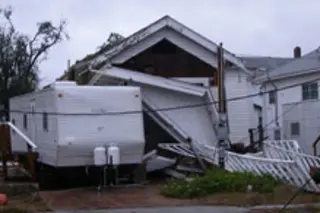In a congressional hearing yesterday, a supplier of the "FEMA trailers" used after Hurricane Katrina admitted that the company has known for years that the trailers contained dangerous levels of formaldehyde. But the chairman of Gulf Stream Coach said his company
failed to disclose to Hurricane Katrina evacuees or the government its internal findings that formaldehyde in some units exceeded a federal health standard by as much as 45 times in 2006 [Washington Post].
Gulf Stream received over $500 million from the Federal Emergency Management Agency (FEMA) for 50,000 trailers that housed displaced Gulf Coast residents after the devastating 2005 hurricanes. But Gulf Stream chairman Jim Shea deflected blame for the evacuees' chemical exposure to FEMA, saying that the agency turned down the company's offer to conduct thorough tests on the trailers. Prolonged exposure to formaldehyde, which is used in industrial glues to make plywood and particleboard,
can lead to breathing problems and is also believed to cause cancer. Complaints by trailer residents began popping up shortly after Hurricanes Katrina and Rita, with residents of FEMA-issued trailers reporting frequent headaches, nosebleeds and other ailments [USA Today]. This past winter, the Centers for Disease Control (CDC) recommended that better housing be found for any evacuees still living in the trailers.
While the Gulf Stream executive was grilled by Democratic lawmakers on the House Oversight and Government Reform Committee, Republican representatives said the trailer company shouldn't be held accountable for the health threat posed to thousands of displaced residents.
Republicans say it is the government's fault for not having standards for safe levels of formaldehyde in trailers [AP]. Democrats argue back that Gulf Stream's tests showed that many trailers exceeded CDC standards for formaldehyde exposure in the workplace, and said those results should have convinced the company to speak up.
Image: flickr/Karen Apricot New Orleans














